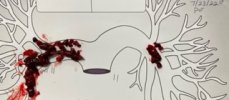- 666
- 51
- 28
Here's one for you guys,
Report of 46 y/o Male c/o chest tightness and muscular feeling pain between shoulder blades, sudden onset. Pt reports "feels like heart is racing," and has been for approximately 45 minutes since they climbed 20 stairs up from their garage. BLS observes non-obese patient in tripod position, breathing at approximately 20/min, SpO2 at 98%, HR at 104 BPM, Glucose 108, no visible retractions, skin warm/pink/dry, bp of 170/110 R, 178/118 L. ALS arrives, 12 lead EKG is unremarkable other than slightly tachycardic. Patient meds are oxycontin and acetaminophen for pain from motorcycle accident 6 months prior. Medical history is motorcycle accident with pelvic fracture and internal stabilization 6 months prior, and removal of pelvic fixation device 3 weeks prior. No cardiac history or any other pertinent medical history. Patient has no family cardiac history, does have family history of type II diabetes. Patient is able to self ambulate, and states that they are in physical therapy and does has been increasing their movement post surgery, to approximately 6k steps per day. This one was close to a miss, but I'll post a picture up later that will make more sense...
Report of 46 y/o Male c/o chest tightness and muscular feeling pain between shoulder blades, sudden onset. Pt reports "feels like heart is racing," and has been for approximately 45 minutes since they climbed 20 stairs up from their garage. BLS observes non-obese patient in tripod position, breathing at approximately 20/min, SpO2 at 98%, HR at 104 BPM, Glucose 108, no visible retractions, skin warm/pink/dry, bp of 170/110 R, 178/118 L. ALS arrives, 12 lead EKG is unremarkable other than slightly tachycardic. Patient meds are oxycontin and acetaminophen for pain from motorcycle accident 6 months prior. Medical history is motorcycle accident with pelvic fracture and internal stabilization 6 months prior, and removal of pelvic fixation device 3 weeks prior. No cardiac history or any other pertinent medical history. Patient has no family cardiac history, does have family history of type II diabetes. Patient is able to self ambulate, and states that they are in physical therapy and does has been increasing their movement post surgery, to approximately 6k steps per day. This one was close to a miss, but I'll post a picture up later that will make more sense...

